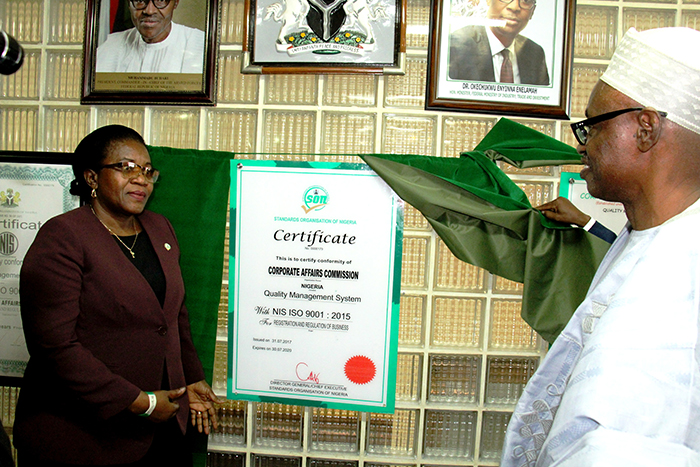Economy
CAC Exceeds 2020 Revenue Target by 4.4%

By Adedapo Adesanya
The Corporate Affairs Commission (CAC) has disclosed that it exceeded its revenue target for 2020 by 4.4 per cent as it raked in N19 billion as Internally Generated Revenue (IGR) in the period under review.
This was disclosed by the CAC Registrar-General, Mr Garba Abubakar, on Wednesday.
According to him, in spite of the COVID-19 pandemic that affected economic activities, the commission recorded an increase in the registration of businesses and other corporate entities during the year.
“The year 2020 was one of our best years in terms of revenue generation as we recorded a surge in registration above the previous year.
“We had a revenue target of N18.2 billion, but we closed here with over N19 billion.
“For the first time in the last 10 years, we are able to give more money to the federal government in terms of operating surplus.
“We are hoping that we will meet our target for 2021 because where there is increased compliance by customers, there will be an increase in the revenue for the government.
“Transactions are now easily carried out with the electronic system, as you pay through the remittal on our portal, without paper works,” he said.
He expressed hopes that the agency would surpass the N20 billion revenue target this year by leveraging on electronic systems transactions for most of its operations.
Mr Abubakar, who was appointed to head CAC on January 7, 2020, by President Muhammadu Buhari, said the commission has undergone some reforms in the past year.
According to him, the organisation has successfully embedded the Federal Inland Revenue Service (FIRS) Tax Identification Number (TIN) on the certificate of registration for companies through the existing FIRS stamp duty portal.
He said that the agency has commenced the implementation of the Companies and Allied Matters Act, 2020 (CAMA 2020) with the introduction of a new self-service portal that allowed for end-to-end electronic submission by customers.
He said that the new CAMA provided a robust framework towards reforming identified legal, regulatory and administrative bottlenecks, which had hitherto slowed down the wheel of doing business for over three decades.
The Registrar-General, however, noted that inherited financial liabilities and the COVID-19 pandemic were some of the challenges he faced in steering the affairs of the organization in the past year.
“The challenges we had last year was the inherited liabilities, as I took over with over N6 billion liabilities, and also had challenges of service delivery because of the COVID-19 restrictions.
“Before the COVID-19 pandemic, we were registering company and business names within 24 hours, but the pandemic and the various restrictions to curb the spread of the disease affected our service delivery,” he said.
Mr Abubakar said that part of the commission’s agenda for 2021 was to build stronger collaborations with relevant agencies and intensify the enforcement of the provisions of the new CAMA.
He tasked all registered entities on compliance with the new law in terms of filing their annual returns and other statutory duties to the commission.
According to him, with the new law, it is now easier for companies to file their returns without going through any lawyer, accountant or chartered secretary.
“With the new portal, a company can decide to have its own electronic account that will allow it to make all its fillings directly.
“The new portal also shows at a glance the status of a company, whether it is active, dormant, receivership or liquidation.
“We have given access to most government agencies and foreign missions in Nigeria to confirm the status of companies and we will continue to do that.
“Before they deal with any registered company, they will verify if such company is actually an active company and whether the information provided by such company is consistent with the CAC records,” he said.
Mr Abubakar further said the commission was working out modalities for granting amnesty on annual returns to companies and other registered entities and it would be announced before the end of the first quarter of this year.
Economy
Customs to Fast-Track Cargo Clearance at Lekki Deep Sea Port

By Adedapo Adesanya
The Comptroller-General of the Nigeria Customs Service (NCS), Mr Adewale Adeniyi, has unveiled a Green Channel initiative at the Lekki Deep Sea Port as part of efforts to simplify cargo clearance, reduce delays, and improve operational efficiency for port users.
The launch marks a major step in customs’ drive to enhance trade facilitation through technology and stakeholder collaboration.
Speaking at the event in Lagos, Mr Adeniyi said the initiative was introduced by the Lekki Deep Sea Port and approved by NCS management to address persistent challenges in container stacking and examination at major ports, which often slow cargo processing.
“This particular intervention helps to move containers right from the vessel into a dedicated place where customers can have access. And between the time the container moves from the vessel to this particular place, it is tracked,” he said.
The customs boss explained that the Green Channel is designed to ensure seamless cargo movement through a dedicated corridor with minimal bureaucratic obstacles, enabling faster turnaround time for importers and other stakeholders.
He described the initiative as a product of mutual trust between the agency and its stakeholders, stressing that compliance and cooperation are essential to its success.
“What we have done today is a product of the kind of trust that we have invested in our stakeholders and the confidence that we also have in them, that they would do this in the spirit of compliance and trade facilitation,” he said.
Mr Adeniyi added that beyond easing port operations, the Green Channel supports Nigeria’s broader economic objective of building a more competitive trade environment, noting that the initiative is expected to reduce the cost and time required to do business, ultimately boosting revenue generation for the service.
Economy
Jim Ovia Denies Knowledge of Wealth Bridge Investment Scheme

By Aduragbemi Omiyale
The chairman of Zenith Bank Plc, Mr Jim Ovia, has dissociated himself from a video making the rounds, purporting that he has endorsed an investment scheme put together by Wealth Bridge.
In a statement, it was emphasised that the video of the businessman is fake, as he has no link with Wealth Bridge, which urged Nigerians to invest in the business.
The management of Zenith Bank has, therefore, advised the public to disregard videos circulated through the Greece Island Facebook handle.
The promoters of the investment scheme promised prospective customers up to N2 million in weekly returns on a contribution of N380,000.
But Zenith Bank stressed that any member of the public who conducts business with the entity does so at his or her risk, as claims in the video that the investment has the backing of the Central Bank of Nigeria (CBN) are untrue.
“The video redirects unsuspecting members of the public to an alleged Arise News webpage with the details of this scheme and an embedded registration portal for signups. This claim is also entirely false and has no connection whatsoever to the bank or its group chairman.
“For the avoidance of doubt, all the videos and promotional materials referenced above are FAKE and have nothing to do with Zenith Bank Plc or Dr Jim Ovia. The Group Chairman of Zenith Bank and the bank have no knowledge of the said investment scheme and have not entered into any partnership with the companies, individuals, or platforms behind these schemes.
“The general public is hereby advised to disregard these fraudulent communications. Anyone who engages with the Greece Island handle, Wealth Bridge, delicious sitee, AfriQuantumX, Stock market analyst 1, or any other entity on the basis of these fake videos and images published by impostors does so strictly at his or her own risk,” parts of the statement read.
Economy
FG to Review Six-Month Shea Export Ban

By Adedapo Adesanya
The federal government has assured stakeholders in the shea value chain that it would review the export ban on shea nuts, citing concerns over its impact on local producers, exporters and foreign exchange (FX) earnings.
On August 26, 2025, President Bola Tinubu directed a six-month temporary ban on the export of raw shea nuts.
According to NAN, the Minister of Industry, Trade and Investment, Mrs Jumoke Oduwole, at a stakeholders’ validation session on the ban on raw shea nuts exports in Nigeria on Thursday, said the ministry would brief the president after consultations across the value chain.
The Minister, at the gathering in Abuja, said the government recognises the right of citizens to earn a living and contribute to national development, adding that all inputs from stakeholders would be carefully reviewed and consolidated.
“All inputs from stakeholders will be carefully reviewed and consolidated before a decision is made on whether the ban should be extended immediately or deferred,” the Minister said, adding that, “The ministry will provide the president with factual and balanced information to guide further action.”
Mrs Oduwole said the ministry engaged widely with stakeholders to ensure all perspectives were considered in the ongoing policy deliberations.
The ministry, she said, received formal submissions from the umbrella association and held engagement sessions attended by various industry representatives.
The minister said the submissions were reproduced and circulated at the meeting to promote transparency and shared understanding.
“Relevant departments within the ministry worked jointly on the matter, and I personally reviewed the submissions to assess our position ahead of broader consultations,” she said.
In his remarks, the Minister of Agriculture and Food Security, Mr Abubakar Kyari, said the meeting was convened to review the ban objectively, underscoring the need for verified facts and transparency.
Mr Kyari said government decisions intend to protect jobs and encourage local value addition, adding that policies should be assessed holistically based on evidence and measurable impact.
Rationalising the ban last August, the Vice President, Mr Kashim Shettima, said while Nigeria produces nearly 40 per cent of the global Shea product, it accounts for only 1 per cent of the market share of $6.5 billion.
“This is unacceptable. We are projected to earn about $300 million annually in the short term, and by 2027, there will be a 10-fold increase. This is our target,” the VP stated.
He explained that the ban was a collective decision involving the sub-nationals and the federal government with clear directions for economic transformation in the overall interest of the nation, stressing that the “government is not closing doors; we are opening opportunities.”
-

 Feature/OPED6 years ago
Feature/OPED6 years agoDavos was Different this year
-
Travel/Tourism10 years ago
Lagos Seals Western Lodge Hotel In Ikorodu
-

 Showbiz3 years ago
Showbiz3 years agoEstranged Lover Releases Videos of Empress Njamah Bathing
-

 Banking8 years ago
Banking8 years agoSort Codes of GTBank Branches in Nigeria
-

 Economy3 years ago
Economy3 years agoSubsidy Removal: CNG at N130 Per Litre Cheaper Than Petrol—IPMAN
-

 Banking3 years ago
Banking3 years agoSort Codes of UBA Branches in Nigeria
-

 Banking3 years ago
Banking3 years agoFirst Bank Announces Planned Downtime
-

 Sports3 years ago
Sports3 years agoHighest Paid Nigerian Footballer – How Much Do Nigerian Footballers Earn





















